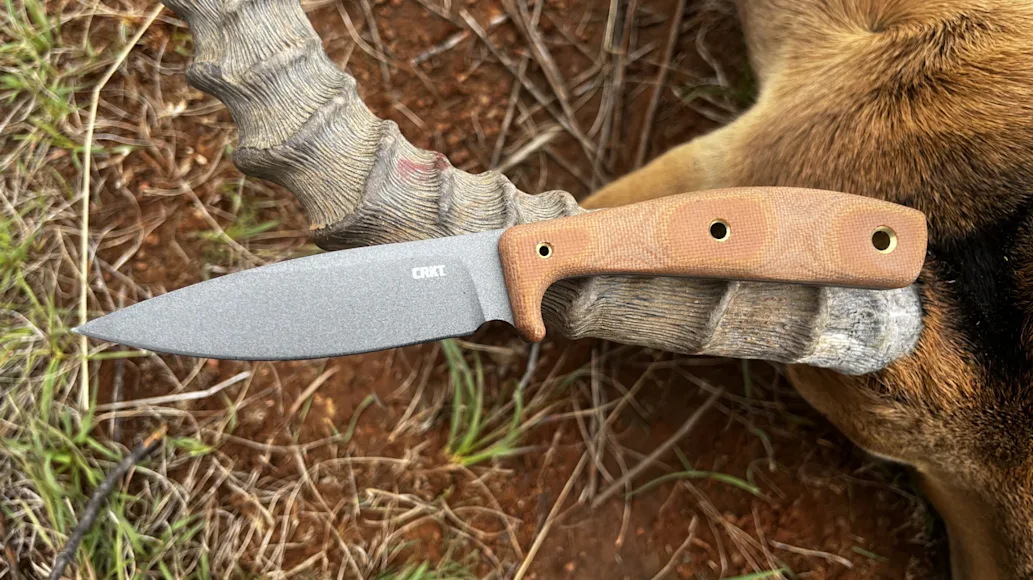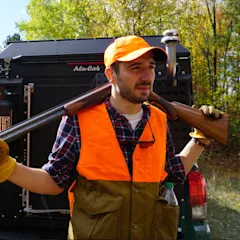We may earn revenue from the products available on this page and participate in affiliate programs. Learn more
You really want a small hunting knife to field dress a deer. What you’re doing is akin to surgery, and you wouldn’t want a surgeon to pull your appendix out with a bowie knife. That said, it helps to have a little horsepower sometimes, especially when quartering a deer for packing.
The following blades, big and small, will have you covered from whitetails to mule deer. Each can do the job of gutting or quartering until you can get the critter home for full-on butchering. Best of all, they’re easy to carry in the woods and shouldn’t weigh you down if you have a long way to go. After hours of testing in the field, these are the best knives for field dressing we've used.
Best Overall: CRKT Soldotna
Best Folding: Benchmade Mini TaggedOut
Best for Caping: Montana Knife Company Sharptailed
Best Budget: Opinel No. 8 Carbon
Best For Quartering: DiamondBlade Knives Surge
Best Overall: CRKT Soldotna
Specs
Overall Length: 7.63 inches
Blade Length: 3.48 inches
Steel: 1095 Carbon
Sheath: Leather
Pros
Feels great in the hand
Not too expensive compared to other premium knives
Just-right size
Cons
Can’t think of much wrong with this knife
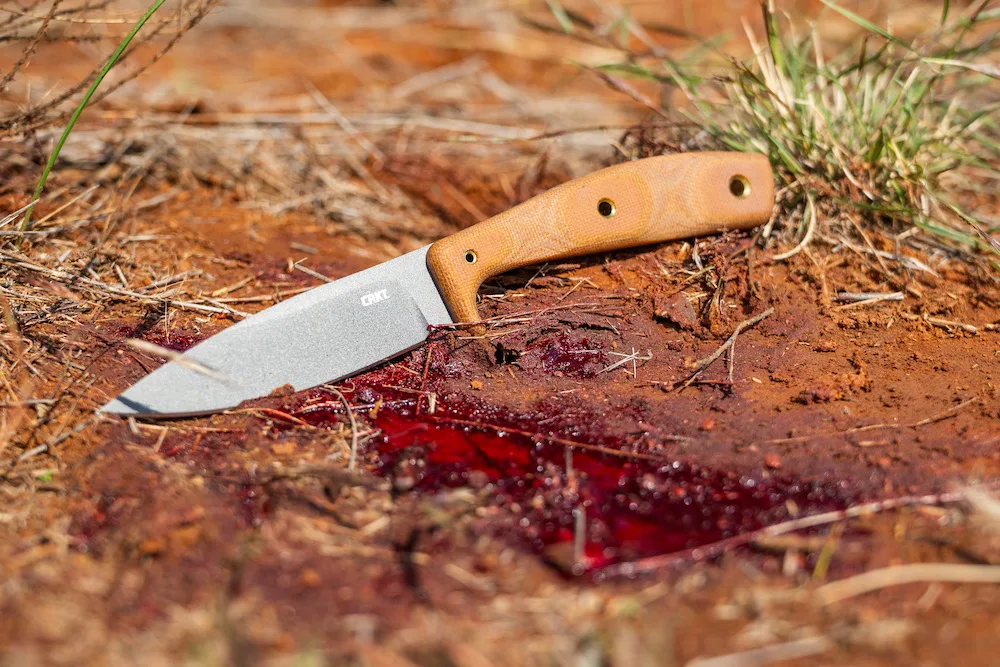
I took this CRKT knife to Africa this past spring. And while you don’t usually do a lot of field dressing in Africa (the skinners are way better at that than any hunter could hope to be), we took the opportunity to test this blade out. The Soldotna is just about the ideal size for a field dressing knife. It’s not too big, not too small. It’s also incredibly easy to keep a hold of, thanks to the grip design and micarta scales. As premium knives go, it isn’t too badly priced either and comes with a quality leather sheath. The 1095 carbon steel on the Soldotna isn’t anything fancy, but it keeps a good edge, and it’s easy to touch up in the field (we recommend one of these knife sharpeners). And with a tough Cerakote finish, you won’t have to worry about it getting rusty.
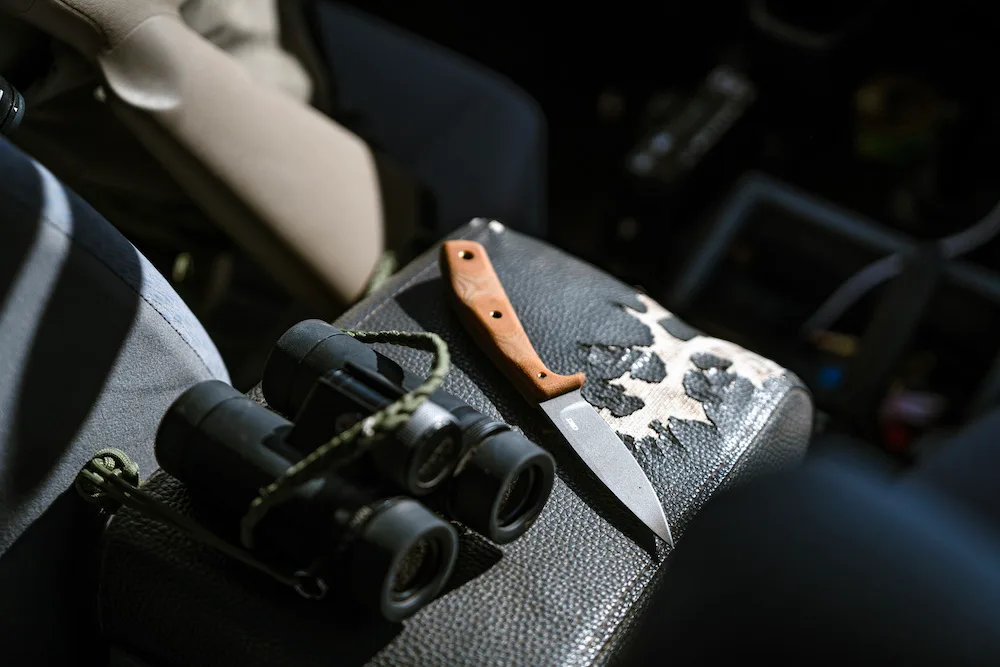
Best Folding: Benchmade Mini TaggedOut
Specs
Overall Length: 7.12 inches
Blade Length: 3.04 inches
Steel: CPM-S45VN Stainless Steel
Sheath: N/A
Pros
Great edge retention
Solid build quality
Opens easily
Lifetime knife sharpening guarantee
Cons
Price

Benchmade knives are some of the best. I loved the original Benchmade TaggedOut when it was released a few years ago, so I was really excited to test out its little brother, the Mini Tagged Out. It didn’t let me down. I broke down two quarters with this knife and cut them into steaks after forgetting my other butcher knives at home. While this folder is small, it’s mighty. The Mini TaggedOut feels a bit like a modern version of a Buck 110 with its clip-point blade. The knife’s pocket clip is strong, and the folding mechanism is rock-solid. It’s also easy to clean and virtually impervious to moisture. While I found the full-size TaggedOut great for deer cutting, I like the Mini even better. And when the season is over, it makes a great EDC knife.
Best for Caping: Montana Knife Company Sharptailed
Specs
Overall Length: 7.125 inches
Blade Length: 2.875 inches
Steel: Magnacut Stainless Steel
Sheath: Kydex
Pros
Lightweight
Razor sharp
Made in the USA
Cons
More expensive

Montana Knife Company is selling this knife as an upland bird knife, and it’s great for that. I cut up a strap full of ducks and a pheasant with it earlier this season. But its small blade and big handle also make it a good knife for caping a buck, too. The Magnacut Stainless Steel blade has incredible edge retention, which is great when you’re cutting close to the bone. I tested other MKC knives made from the same steel on sisal rope and they had some of the best edge retention I’ve seen. If you have to make precise cuts around eye sockets and antlers, reach for a Sharptailed.

Best Budget: Opinel No. 8 Carbon
Specs
Overall Length: 7.59 inches
Blade Length: 3.28 inches
Steel: Carbon
Sheath: N/A
Pros
Costs as much as a 12-pack of beer
Easy to sharpen
Cons
Dulls quickly
When I used to work as a hunting guide, I field dressed a lot of bucks, and I did them all with an Opinel No. 8 made of carbon steel. I’ve lost more No. 8s than I can count, but it was never a heartbreaker. These knives cost around $20, and you can find them all over the place. The soft steel on the No. 8 will get dull, but you can turn it back into a razor with a few quick passes on a stone. It will also oxidize if you don’t keep it dry, but in my world, that’s called patina.
Best For Quartering: DiamondBlade Knives Surge
Specs
Overall Length: 9.25 inches
Blade Length: 4 inches
Steel: Friction Forged D2 Steel
Sheath: Kydex
Pros
Rugged design
Edge retention off the charts
Cons
Price, but it’s about the best no-nonsense hunting knife you can buy

DiamondBlade’s Friction Forging technology gives the brand's knives the most outrageous edge retention on the market. Combine that with a sweeping blade and robust Santoprene handle, and you get a knife that will run through season after season of quartering big game. The Surge is a rugged, hard-working knife for a serious deer hunter. It comes with a sturdy plastic sheath that can lock to a belt and retains the blade very well. The jimping on the spine is aggressive, and the blade is frighteningly sharp. In the hand, it feels like you have absolute control over the knife, letting you bear down on joints and pop bones out of sockets. With a solid track record with professional guides, the Surge is the perfect knife to skin, quarter, and pack out a deer.
Tops El Pionero
Specs
Overall Length: 7.63 inches
Blade Length: 3.38 inches
Steel: 1095
Sheath: Kydex
Pros
Small and easy to control
Lightweight
Cons
A bit small for some bigger field dressing tasks

The El Pionero is a killer blade for all-around field dressing. It’s super easy to control and very lightweight. Designer Ed Calderon designed the knife around a simple paring knife that you’d find in the kitchen. And just as a paring knife is easy to control, the El Pionero is, too. Most buy this knife for EDC carry, and if you’re a hunter you might want to do the same. It’s a utility knife that can be pressed into service for field dressing should your trip to town turn into a deer hunt.
Spyderco Bow River
Specs
Overall Length: 8.14 inches
Blade Length: 4.36 inches
Steel: 8Cr13MoV
Sheath: Leather
Pros
Affordable
Comfortable in the hand
Cons
Cheaper steel, but still a solid knife

If the Opinel wasn’t so darn cheap, the Spyderco Bow River would have gotten the nod for a budget pick. In a world of knives that rarely go below $150, the Bow River is a quality blade that only costs around $70. It’s a solid knife for the money with a 4.36-inch blade that’s on the large side of field dressing knives. I think it’s best for quartering game more than anything else. The swept-back blade will make quick work of skinning the side of a deer, and its large handle gives you enough purchase to take a deer apart.
GiantMouse GMF2-P-R
Specs
Overall Length: 8.12 inches
Blade Length: 3.63 inches
Steel: N690
Sheath: Leather
Pros
Full-tang construction
PVD coating
Cons
Not much—this is a solid knife at a good price

I have been seriously impressed with GiantMouse folders over the past couple of years. That’s why I was eager to test a fixed blade from the relatively new company. GiantMouse made this knife to be rugged, letting you have a tool in the woods that could double as a field dressing knife should you need it. It has a full tang construction, G10 handle, and a PVD coated N690 steel blade. I’m not crazy about the dangle-style leather sheath, but that’s a personal thing. Otherwise, this knife will serve you well, especially if you need to do a little bushcrafting while you’re after a buck.
Old Timer Switch-It Hunting Kit
Specs
Overall Length: Multi
Blade Length: Multi
Steel: Stainless
Sheath: Plastic case
Pros
Highly versatile
Gives you everything you need to dress an animal
Cons
A bit too big to carry every day

I hesitated to include the Switch-It Hunting Kit, not because it’s a bad kit of knives, but because it’s a bit much to bring along for field dressing. That said, I hunted last year with a friend who brought a kit of field dressing tools like this in his backpack on our trip to Alabama. When we got a buck, it made the whole job much easier. The Switch-It kit lets you use one handle for several blades and a bone saw. It all fits into a rugged and easy-to-pack hard plastic case. I would bring one to a tree stand if you like having more options for cutting up a deer, and it’s a great addition to camp for cutting skull plates or even butchering.

How I Tested Field Dressing Knives
New hunting knives come on the market every year. I first took stock of what’s out there and made a big list of new knives. Then, I whittled it down to a manageable list and started sending emails to companies for samples to test.
I took these knives on several hunts over the season—two whitetail hunts, one mule deer hunt, and a trip to Africa. (There aren’t a whole lot of deer in Africa, but there are deer-sized game.) I packed each knife along for the ride, and when possible, I used them to break down bucks from New York to Kimberly. For the rest of them, I deboned and broke down some mule deer quarters. And while this isn’t exactly field dressing, it gave me an idea of how the blades feel in the hand and hold up to repeated use on real flesh and bone.
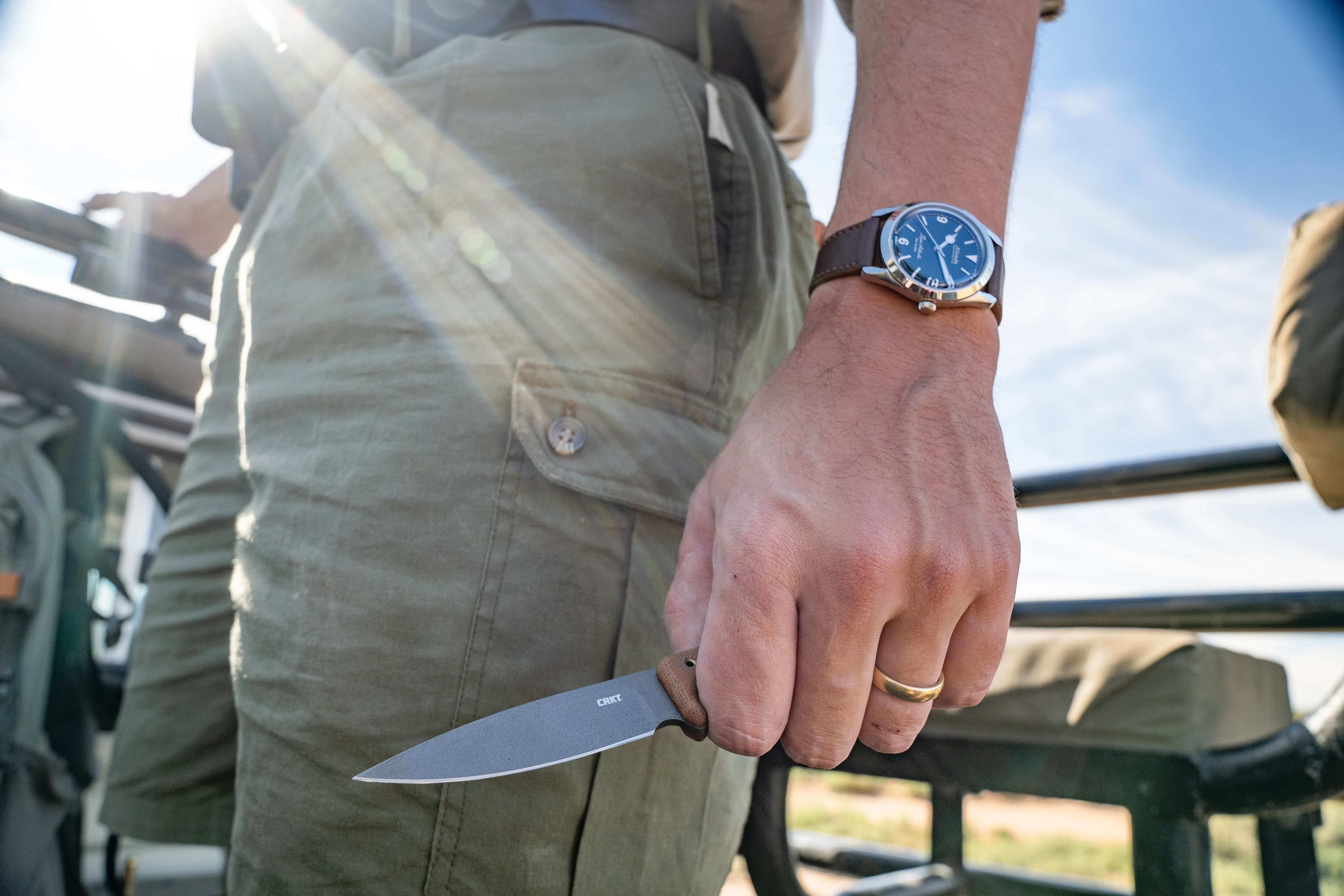
What To Consider When Choosing a Knife for Field Dressing
Size
Field dressing knives that are small usually work better for deer. They’re easier to control and use to make precise cuts. When you’re field dressing an animal, you want to avoid cutting into the nasty bits, like the bladder, colon, and intestines. Smaller blades make that easier.
Blade Design
Blades on field dressing knives should be sharp and hold an edge reasonably well. If you’re quartering an animal in the woods, edge retention is more important because there’s more of a chance for the knife to contact bone. You might also look for a blade design that sweeps back more to help with skinning. If you’re caping an animal, you’ll need an even sharper, smaller blade, and it’s a good idea to go with a disposable blade, like those found on a Havalon.
Most hunting blades come in either a clip point or a drop point. The blade design impacts the knife’s performance.
Clip Point: A clip point knife blade looks slightly tapered at the point of the blade. These lend to easier penetration through the skin as the clip makes it easier to puncture with less pressure applied. Since less pressure is needed, you’re less likely to slip or puncture too far into the animal, accidentally damaging organs.
Drop Point: A drop point blade appears sloped from the blade’s spine to the tip. The spine is often thicker than the tip because of the sloping nature of the design. These blades are considered stronger because they are thicker, but they won’t have as easy of time penetrating through the skin. However, it is easier to cut around bones or through joints.
A combination of the clip point and drop point blade is ideal. If you are still determining which style you like the most, it always helps to have a mentor or a few friends with a variety of knives so you can test a few out before you invest in your own. These two blade designs are commonly seen for field dressing knives. If you are looking at specialty knives for skinning or things like a gut hook, the blade design will be entirely different.
Usability
A field dressing knife should be easy to grip when wet. Your hands will probably be covered in blood, and if your knife is slippery, it’ll be harder to use. It will also be easier to cut yourself.
Look for one that's easy to clean, too. Blood and guts have a way of getting into the tiny cracks of a folding knife. You’ll want to be able to take your field dressing knife and give it a good scrubbing once you get home.
FAQs
Q: How long should a hunting knife be?
Most experts recommend a hunting knife to be between 2 to 4 inches long, depending on the intended use. Shorter blades provide more precision while cutting or dressing an animal.
Q: What is the best knife to field dress a deer?
The best knife to field dress a deer has a fine blade and a good handle for a sturdy grip. Knives for field dressing deer tend to be a little bit longer than others, around 4 inches, to give you a firmer grip and prevent the knife from slipping as you cut. The grip is important to ensure it won’t slip around in your hand as blood gets onto the knife.
Q: What should I look for in a field dressing knife?
When choosing a field dressing knife, there are two main things to look at: the blade and the handle. Selecting the proper blade for the job is necessary. For instance, while you wouldn’t use a shorter replaceable blade for skinning, you could use it for maneuvering around smaller game.
Q: What blade shape is best for skinning?
The top skinning knives have a curved blade with a fixed handle. The blade is very thin and lightweight, and has the sharpness of a scalpel. A thin blade for skinning is necessary to cleanly cut underneath the hide without tearing the hide.
Q: How do you clean a knife after field dressing?
Generally, you can get away with wiping the knife down with a handkerchief or cloth and re-sheathing it until you get home to give it a deeper clean. If you are in the field for a while before you get home, give it a quick rinse with soap and water at camp to get the knife as clean as you can before you get back. Be sure to wait to put it away until it is completely dry.
Final Thoughts
Knowing the intended purpose of a field dressing knife is always the best way to narrow down your options. While there are a lot of very versatile knives out there, as you may already know, personal preferences and knife designs can vary according to the animal you’re hunting. Whether you’re looking for an all-purpose knife or one specific for elk, we hope you found the right knife for field dressing on our list.
Why Trust Us
For more than 125 years, Field & Stream has been providing readers with honest and authentic coverage of outdoor gear. Our writers and editors eat, sleep, and breathe the outdoors, and that passion comes through in our product reviews. You can count on F&S to keep you up to date on the best new gear. And when we write about a product—whether it’s a bass lure or a backpack—we cover the good and the bad, so you know exactly what to expect before you decide to make a purchase.

